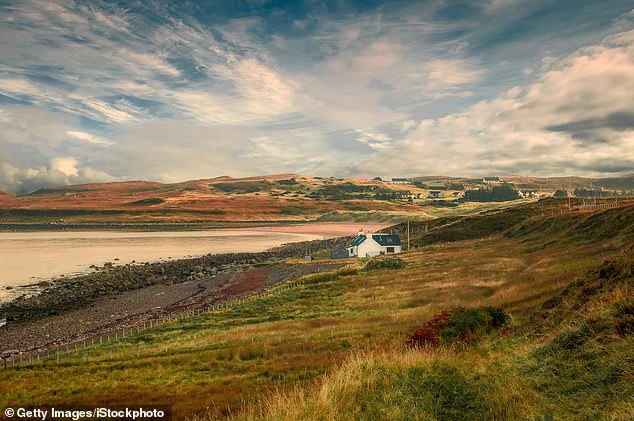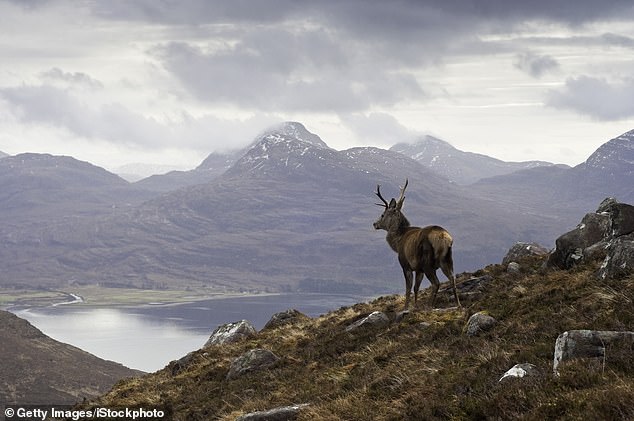Braving Highland storms for life on the wild side: Scientist reveals in her memoir how she gave up a well-paid job for a simpler way of life in Scotland
Memoirs
Windy by Annie Worsley (William Collins £16.99, 304 pages)
Writing in nature experiences something of a purple patch – perhaps a response to our increasingly fast-paced, technology-dependent world.
Smart publishers will, rightly, keep an eye out for repeats of the bestsellers, which often combine nature writing with emotional heft, leading to a kind of transformation: H is for Hawk, Wild Fell, Landlines.
There must have been undisguised joy when Worsley’s memoirs landed on her publisher’s desk.
Because Worsley is the Real Deal. She is a physical geographer and former professor of environmental change. She is a scientist who writes like a poet. Her account is less a nature almanac and more a revelation of what it is to live where life is measured by seasons, weather and light.

Majestic scenes: South Erradale
After ‘a lifetime of visits’, Worsley and her husband Rob gave up well-paying jobs for a simpler life and took over Red River Croft in the small village of South Erradale in Scotland’s north-west highlands.
The Worsleys treat their management with due respect: they grow their own produce using seaweed as fertilizer, are excited about the return of salmon to the river and offer their fields as a retirement home for two old Shetland ponies, Cindy and Tom.
They live at the mercy of the elements, dominated by the winds blowing from the Atlantic Ocean. To this extent the wind has a special Gaelic vernacular (see: gaoth feadalaich ‘the whistling wind’) and its own gods: Beira, the bringer of wind, and Cailleach, who rides through storm clouds on the back of a wolf.
Fortunately, Worlsey is a leannan gaoith – a wind lover – even during storms that rage for weeks. According to her neighbor Cathma, whose family has farmed the land for generations, this drives Worsley ‘crazy’.
But when the storms turn to gentle breezes and the lark’s song heralds spring, you see the appeal of farm life. Worsley’s connection to the landscape is profound – both academic and emotional – and it shows.
Even the most city-bound reader will feel the dramatic shift of the seasons through Worsley’s writing. The blushing yellow catkins; the smell of summer ‘as sweet as the head of a newborn baby’; October, where breathtaking ‘nuclear’ sunsets compete with early snowfall; and the long, gray, dark days of autumn and winter.
It takes a certain kind of spirit to thrive somewhere in this wilderness, where darkness reigns for half the year. But Worsley finds solace in the ancient majesty of the landscape. She writes movingly about her mother’s cruel, painful death from mesothelioma; the funeral forever linked to the winter solstice. But in the Highlands, the darkness is complete, yet filled with the sounds of life, and within it Worsley feels connected to those she has lost.


After ‘a lifetime of visits’, Worsley and her husband Rob gave up well-paying jobs for a simpler life and took on Red River Croft in the small village of South Erradale in Scotland’s north-west highlands (stock photo)
Worsley himself is no stranger to pain. Struck by a debilitating mystery virus, she suffered for years from painful attacks on her immune system. No longer able to climb the peaks, she took short walks around the farm, finding beauty in the smallest things (lichens, the miracle of peat that grows only 1 cm every ten to twenty years), and then to the river, accompanied by its unusual character. docile collie, Dram.
The woman and dog become spectators, resting on the wooden chair that Rob made for his wife from driftwood – the contemplation chair. It is here that Worsley encounters a stranger who tells her that ‘there is no greater achievement than to have breathed extra shape and life into a place – that is true belonging’.
Life on the farm recalls her childhood holidays in Wales, when her grandfather told her to ‘listen to the land; it whispers to us’.
Now she views her life as a geographer who studies ecosystems, which are guided by a periodicity of eleven to twelve years. The current cycle is filled with northern lights, red rivers, otters and eight grandchildren.
Let’s face it: few of us are likely to experience life quite like Worsley: remote, wild, elemental, between mountains and sky. But through these pages we get a tantalizing glimpse of this other world. It’s like breathing in the pure, invigorating air of the Scottish Highlands and it’s a very welcome treat.
